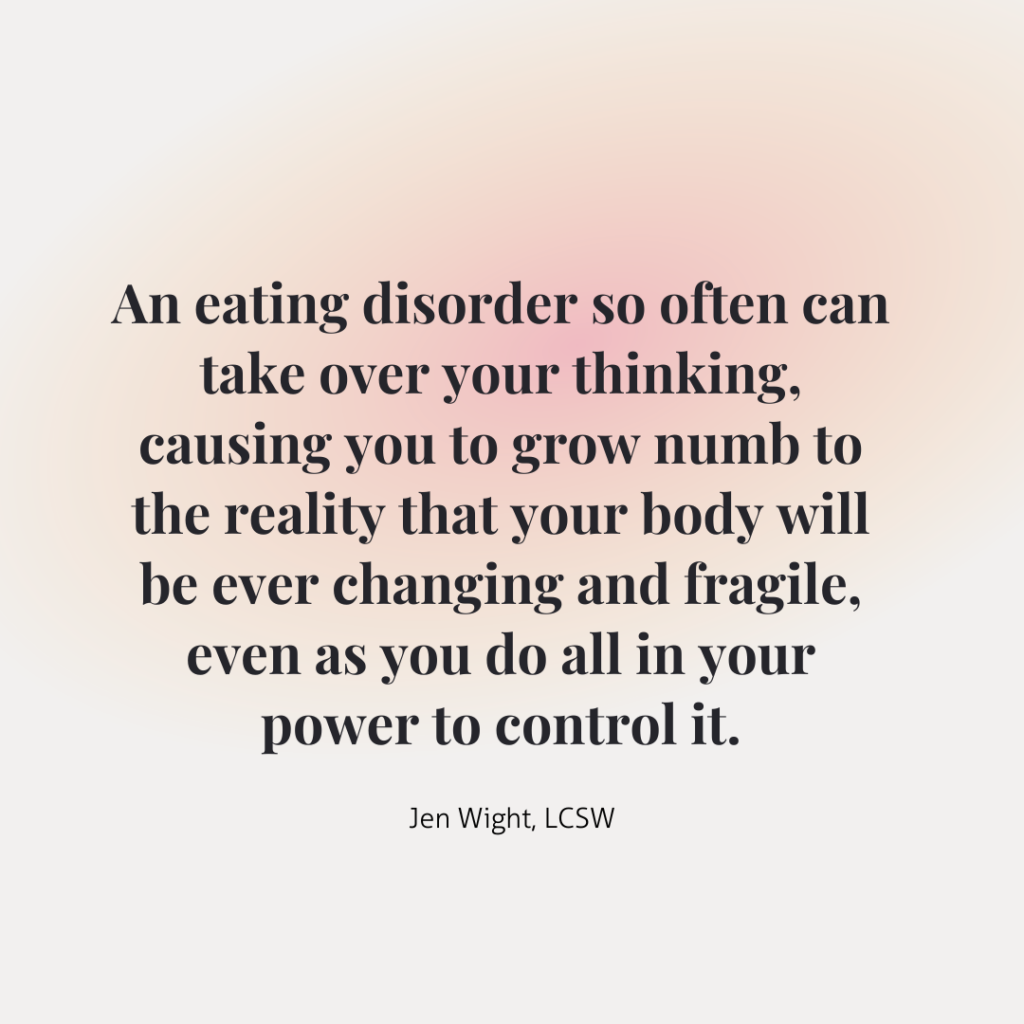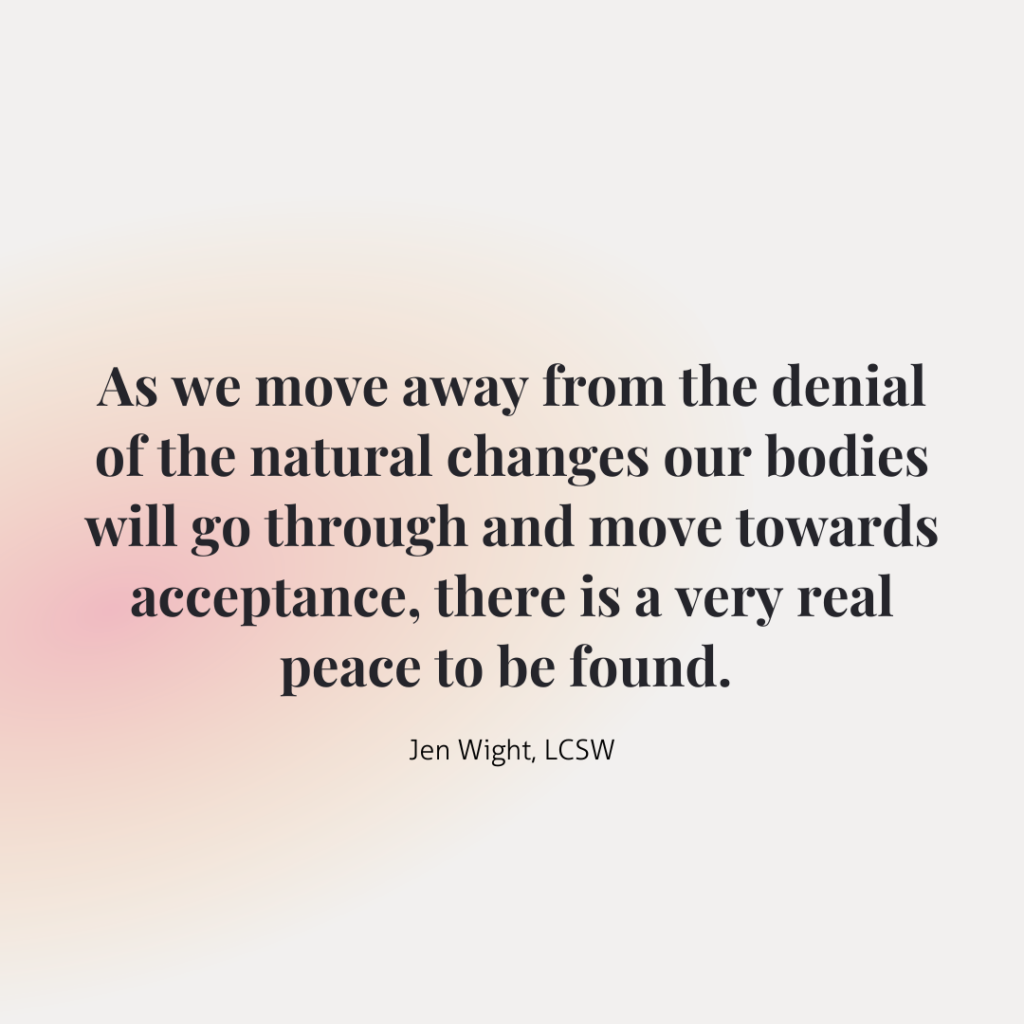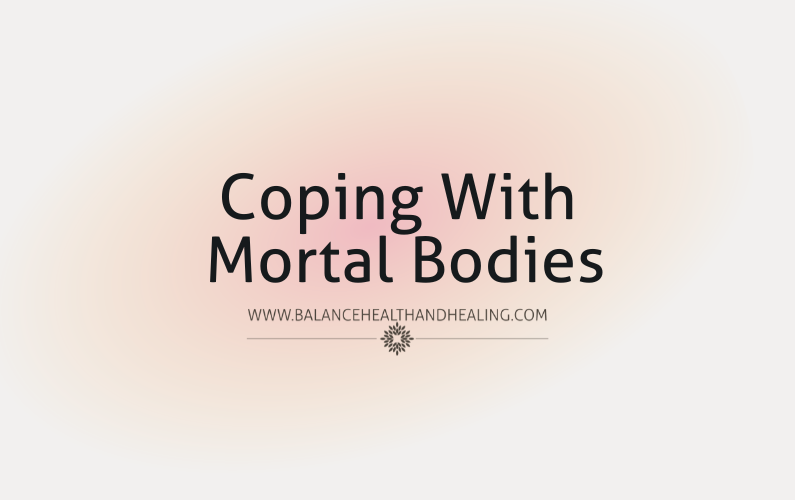Coping with mortal bodies
We all live in bodies that will die someday. (Nothing like starting off this blog post on a high like that, right?!)
I tend towards a natural disposition of optimism, and as part of that, I shy away from more realistic or pessimistic points of view. However, when it comes to my body- I find myself leaning into the very certain realities that my body will one day fail. I will die. Nothing within my power to control can change that reality.
I was delighted the other day to stumble upon an article where elderly persons were asked what advice they would give to their younger selves. Predictably, much of the advice centered around cherishing relationships, straightening out priorities, and the pursuit of education. None of the advice touched on things I frequently work through with my clients in therapy- themes of needing control over their bodies and appearances, many times, at the detriment to the other priorities in their lives.
While being realistic on what the certain end to our mortal journey will be, I find there is a lot of freedom in the perspective that controlling my body is not the central task of my personhood. I am a whole person, with a mind that needs enlightening, relationships that need looking after and delighting in, and responsibilities that need attention. My body is a part of who I am, but in the end, I will likely not be remembered- for better or for worse- by my body. And I will likely not come to the end of my life wishing I had spent less time in work I was fulfilled by or with people I love and more time obsessing over my calorie count, pant size, or outward appearance.
Illusions of control
An eating disorder so often can take over your thinking, causing you to grow numb to the reality that your body will be ever changing and fragile, even as you do all in your power to control it. As part of being human, we are subject to frailties. The thought that engaging in the strict control an eating disorder will have over your body will not exempt you from this reality. The feeling of control an eating disorder can provide is in actuality just an illusion.
Acceptance of what we can’t change
We can’t change the reality that our bodies are meant to age with the passage of time- no amount of botox can stop the process. I often have clients ask me, “Why would I accept what I can’t change?” This concept feels like relinquishing control or giving up entirely. But I have found there is great freedom in the act of acceptance of things we can not change.
Freedom in acceptance
It can be helpful in understanding this concept to think first about what the opposite of acceptance is- denial. When we are denying reality, we stay locked up in the pain and struggle within ourselves. The ability to look reality squarely in the eye and move forward with acceptance is actually such a radical act of courage.
Psychologist Christopher Germer suggests that arriving at true acceptance is a process. He theorized the path to acceptance often happens in this way:
“Step 1: Aversion: We instinctively respond to uncomfortable feelings with resistance, avoidance, or rumination (repetitively reviewing a problem to solve it). You’ll do anything to escape the feelings or situation, or you lay awake at night going over and over it in our mind, without coming to any solutions.
Stage 2: Curiosity: When aversion and avoidance doesn’t work, you may become curious about your problem. You are very gradually starting to see the issue with more objectivity and clarity. You want to learn more about it; even though you may not like it and you feel anxious. However, when you become curious, you may find your anxiety decreases. You are starting to try to find meaning and learn from the experience.
Stage 3: Tolerance: In this stage, you begin to be able to tolerate and endure the pain you feel about a situation, even though you still wish it would disappear. Tolerating means staying with the feeling or situation, rather than avoiding and resisting reality.
Stage 4: Allowing: As your resistance begins to disappear, you can begin letting feelings come and go—much like the tides come in and go out again. You realize that no feeling lasts forever and you’re able to acknowledge feelings and really feel them. You allow reality into your awareness, without pushing it away.
Stage 5: Friendship: In this stage, you value and appreciate your feelings. They are not something to be avoided anymore. It’s not that you want to feel upset or sad, but you can be grateful for the benefits that a situation brings to your life. Until you reach this stage, it can be very hard to see any benefit to a painful situation” (Germer, 2009).
As we move away from the denial of the natural changes our bodies will go through and move towards acceptance, there is a very real peace to be found. And as we make peace with our bodies, we are freed up to pursue lives full of meaning- meaning that we get to be very selective and intentional about!
https://seasonsretirement.com/15-seniors-give-advice-to-their-younger-selves/
Germer, C. K. (2009). The mindful path to self-compassion: Freeing yourself from destructive thoughts and emotions. New York:Guilford Press.

